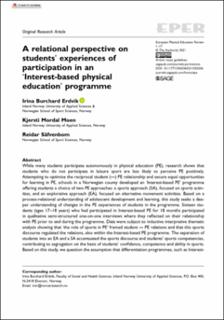| dc.contributor.author | Erdvik, Irina Burchard | |
| dc.contributor.author | Moen, Kjersti Mordal | |
| dc.contributor.author | Säfvenbom, Reidar | |
| dc.date.accessioned | 2021-12-01T07:22:56Z | |
| dc.date.available | 2021-12-01T07:22:56Z | |
| dc.date.created | 2021-06-24T11:21:44Z | |
| dc.date.issued | 2021 | |
| dc.identifier.citation | European Physical Education Review. 2021, . | en_US |
| dc.identifier.issn | 1356-336X | |
| dc.identifier.uri | https://hdl.handle.net/11250/2832219 | |
| dc.description.abstract | While many students participate autonomously in physical education (PE), research shows that students who do not participate in leisure sport are less likely to perceive PE positively. Attempting to optimise the reciprocal student (↔) PE relationship and secure equal opportunities for learning in PE, schools in a Norwegian county developed an ‘Interest-based PE’ programme offering students a choice of two PE approaches: a sports approach (SA), focused on sports activities, and an explorative approach (EA), focused on alternative movement activities. Based on a process-relational understanding of adolescent development and learning, this study seeks a deeper understanding of changes in the PE experiences of students in the programme. Sixteen students (ages 17–18 years) who had participated in Interest-based PE for 18 months participated in qualitative semi-structured one-on-one interviews where they reflected on their relationship with PE prior to and during the programme. Data were subject to inductive interpretive thematic analysis showing that ‘the role of sports in PE’ framed student ↔ PE relations and that this sports discourse regulated the relations, also within the Interest-based PE programme. The separation of students into an EA and a SA accentuated the sports discourse and students’ sports competencies, contributing to segregation on the basis of students' confidence, competence and ability in sports. Based on this study, we question the assumption that differentiation programmes, such as Interest-based PE, will optimise student ↔ subject relations if these relations remain governed by the sports discourse, rather than the PE curriculum. | |
| dc.language.iso | eng | en_US |
| dc.rights | Navngivelse 4.0 Internasjonal | * |
| dc.rights.uri | http://creativecommons.org/licenses/by/4.0/deed.no | * |
| dc.title | A relational perspective on students' experiences of participation in an ‘Interest-based physical education’ programme | en_US |
| dc.type | Peer reviewed | en_US |
| dc.type | Journal article | en_US |
| dc.description.version | publishedVersion | |
| dc.source.pagenumber | 17 | en_US |
| dc.source.journal | European Physical Education Review | en_US |
| dc.identifier.doi | 10.1177/1356336X211023536 | |
| dc.identifier.cristin | 1918112 | |
| cristin.ispublished | true | |
| cristin.fulltext | original | |
| cristin.qualitycode | 1 | |

